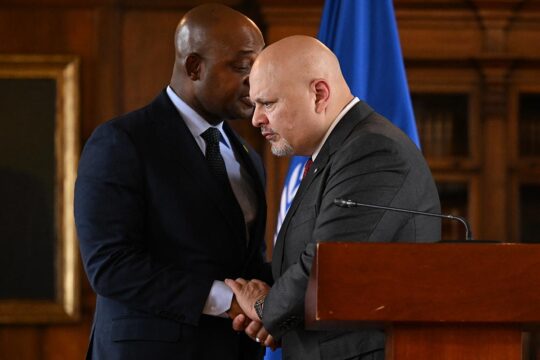The recent remarks of Mayor Mitch Landrieu ordering the removal of monuments honoring confederate leaders from New Orleans stands out as an important moment of moral clarity and civic courage for our country. The question is, how do we build on the success of the “take ‘em down” movement to tackle the deep, ongoing history of racial violence in the United States.
We also need to see many more leaders on the local, state and national levels addressing the past truthfully, apologizing for the multitude of abuses committed against people of color and correcting our twisted historical narrative. Such efforts are particularly important at this moment when revisionism is on the rise in our country, with our leaders ignoring, dodging or in some cases denying our racial history. We have failed to address the numerous racially based policies of mass incarceration, suppression of minority voters and the continued institutional violence against minorities by law enforcement, which are the legacies of slavery and Jim Crow.There is a direct line between the dehumanization of African-Americans during slavery, Jim Crow and the New Jim Crow and honoring Confederate “heroes” who were willing to kill for the cause of white supremacy. We generally honor those of high achievement with statutes in prominent places. Thus, a statute to a Confederate is a monument to white supremacy and clearly understood as such by people of color. In this way, despite legally overturning race-based slavery, white supremacy has continued to ride astride New Orleans and many other parts of the country long after the Civil War. The removal of the statutes is an important blow to the white-supremacy ideology that has enabled wide spread abuses and terror to continue to this day. Mayor Landrieu spoke the unvarnished truth about the deepest of American sins:
“These statutes are not just innocent remembrances of a benign history. These monuments purposefully celebrate a fictional, sanitized Confederacy; ignoring death, ignoring the enslavement, and the terror that it actually stood for.”
By removing the statues, his words have been accompanied by resolute action. Other countries have addressed their pasts much more thoroughly, with apologies, reparations and other steps. The government of South Africa, through its Truth and Reconciliation Commission, acknowledged and apologized for the abuses of apartheid. Germany has taken many steps to address its terrible crimes against Jews and others, through reparations programs, trials of the perpetrators, memorials and former German Chancellor Willy Brandt’s “knee fall” in the Warsaw Ghetto. The failure to acknowledge our past goes well beyond New Orleans and Louisiana, as racial injustice continues to reside in virtually every aspect of American life. For myself, growing up in a small southern town, I recall the monuments to the Confederate war dead, the ahistorical text books on Reconstruction, the utter fabrication of the “benign” slavery period and the many aspects of segregation, whether enforced or “voluntary,” not to mention the deification of Confederate General Robert E. Lee. These false narratives and damnable lies, however characterized, have never been fully reckoned with. A key element in addressing this historical fairy tale and the underlying gross violations of basic human rights, including segregation and lynching (referred to as extrajudicial killings in more modern human rights vernacular), is to acknowledge officially the abuses and to be honest about what has happened.A key driver in taking on these falsehoods has been grassroots organizations such as Black Lives Matter, the Equal Justice Initiative and their partners, which have worked to ensure that the story is told from the perspective of enslaved people and from those who experienced Jim Crow, segregation and the horrors of “separate but equal.” Their work has been essential in New Orleans and elsewhere to bringing out the truth and exposing the lies of the past.We need to heed activists’ calls for more memorials and museums such as the Smithsonian National Museum of African American History & Culture and the International African American Museum, in Charleston, SC. More importantly, we need to seriously address the police practices that violate on a large scale the fundamental rights guaranteed by the Constitution and civil rights laws. Last but hardly least, the issue of mass incarceration of African-Americans and other minorities must be addressed as a matter of urgency.While our national leaders, at present, appear very unlikely to address these issues — instead they seem driven to use race to further divide us — there are strong civil society movements and other elected leaders who can play an important role in addressing these deepest of American issues. Mayor Landrieu and indeed the City of New Orleans have provided us with an important example of addressing a very troubled past and the most haunting injustices of our history.





